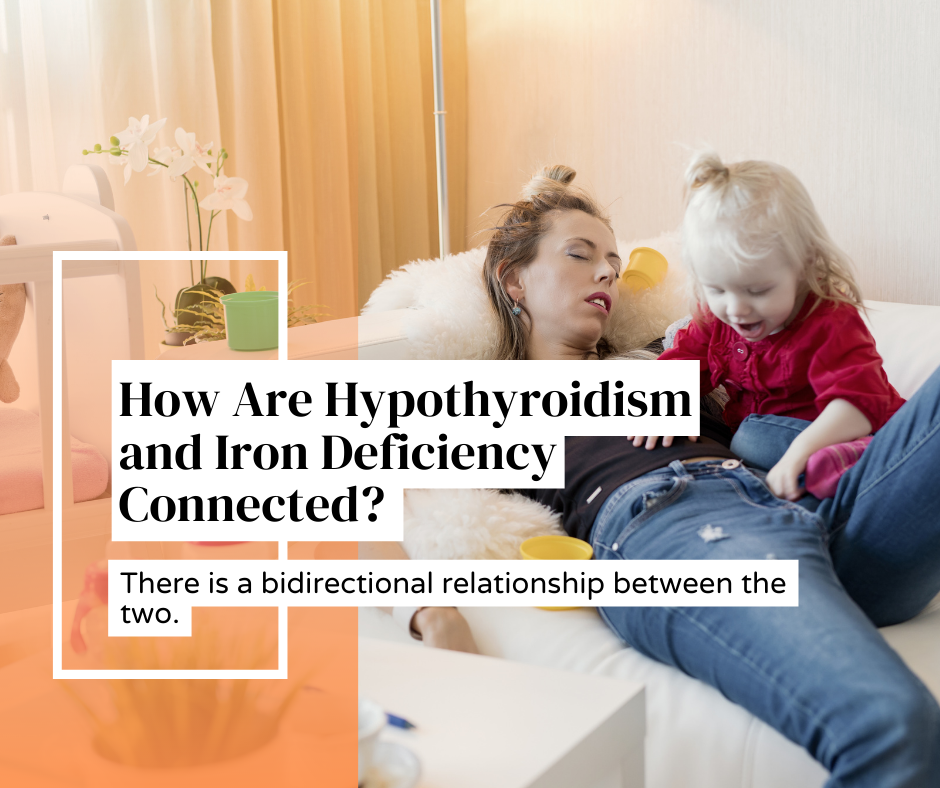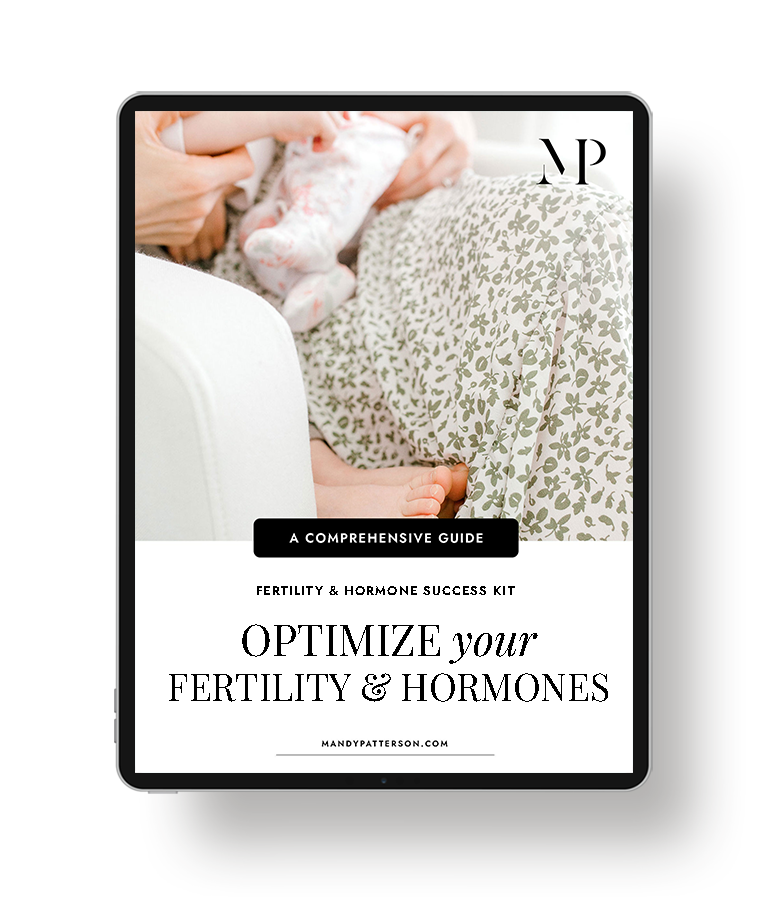Fatigue is often the most common symptom of hypothyroidism. It also happens to be the most common symptom of iron deficiency. In this article, you’ll learn how hypothyroidism and iron deficiency are connected. This may come as a surprise to you, but there is a deeper connection between these two conditions than their similarity in symptoms.
If you are a patient with hypothyroidism you’re likely aware of the fact that low thyroid hormone levels slow metabolism and cause fatigue. What you might not know is that there exists another possible cause for your fatigue. Iron deficiency anemia could be to blame for your exhaustion.
That’s not all, iron deficiency and hypothyroidism adversely impact each other. This article will cover everything you need to know about these two conditions like how to get a diagnosis and treatment protocols. Keep reading to learn more!
Thyroid Disorders
Hyperthyroidism
Hyperthyroidism occurs when the levels of thyroid hormones are higher due to an overactive thyroid gland. Symptoms include unexplained weight loss, increased appetite, depression, feelings of anxiety, difficulty sleeping, and fewer menstrual cycles.
If you have hyperthyroidism, you likely have high levels of ferritin. Ferritin is a protein that helps your body store iron. An overactive thyroid gland produces high amounts of ferritin. Likewise, high ferritin appears to trigger an inflammatory response that prevents the body from using iron normally.
This type of iron deficiency is most often seen in people with Graves Disease, the autoimmune condition of hyperthyroidism.
Hypothyroidism
Hypothyroidism occurs when the levels of thyroid hormones are lower due to an underactive thyroid gland. Common symptoms of hypothyroidism include weight gain, fatigue, constipation, feeling cold, thinning hair, pale skin, and increased menstrual bleeding.
Iron deficiency anemia occurs in hypothyroidism due to the low level of thyroid hormones. The low levels suppress the activity of bone marrow, which is the tissue that makes red blood cells. That lowers the production of red blood cells and triggers anemia.
Subclinical Hypothyroidism
Subclinical hypothyroidism is an early, mild form of hypothyroidism. It’s called subclinical because only the serum level of thyroid stimulating hormone (TSH) from the front of the pituitary gland is a little bit above normal. Research shows that subclinical hypothyroidism should be treated in iron-deficiency anemia patients when both conditions coexist.

Hypothyroidism can lead to anemia, and iron deficiency can interfere with thyroid function. Iron deficiency without anemia can also cause fatigue in people with thyroid conditions.
Anemia
Anemia occurs when your blood contains less than the normal number of red blood cells or if your red blood cells don’t have enough hemoglobin.
Hemoglobin is an iron-rich protein that gives your blood its red color. It helps bind oxygen, fight infections, and prevent blood loss by inducing blood clotting. If you have anemia, your body does not get enough oxygen-rich blood.
Not to mention, anemia is closely related to iron deficiency. In fact, iron deficiency is the most common nutritional deficiency affecting at least one-third of the world’s population.
Hypothyroidism can lead to anemia, and iron deficiency can interfere with thyroid function. Iron deficiency without anemia can also cause fatigue in people with thyroid conditions.
Iron Deficiency Anemia
Moreover, iron deficiency occurs when your body does not have an adequate supply of iron stores. Sometimes, this can lead to anemia, where your blood lacks a sufficient amount of healthy red blood cells (RBCs).
The most apparent cause of iron deficiency is blood loss. Women are more likely to have iron deficiency than men because of menstrual bleeding. Other instances where iron deficiency may occur include pregnancy, postpartum, and breastfeeding. However, a diet low in iron can also lead to iron deficiency.
More to the point, when you have hypothyroidism the lack of thyroid hormone is enough to cause changes to stomach acid levels and alter iron absorption. Thus, leading to iron deficiency anemia.
How Are Iron Deficiency and Hypothyroidism Related?
Hypothyroidism can lead to anemia, and iron deficiency can interfere with thyroid function. Iron deficiency without anemia can also cause fatigue in people with thyroid conditions.
Here’s the thing, because of the bidirectional relationship between iron deficiency and hypothyroidism, if you experience one you are likely to experience the other.
More specifically, iron is required for proper thyroid function. It is required for the creation of thyroid hormones, and low iron levels are also associated with low levels of free T3 (one of the thyroid hormones).
When you have low serum iron levels in the body your TSH rises indicating a state of hypothyroidism.
Remember, a high TSH means low thyroid (hypothyroidism) and a low TSH means high thyroid (Hyperthyroidism).
Additionally, the lack of thyroid hormone in hypothyroidism causes changes to stomach acid levels and alters iron absorption.
Essentially, what we are looking at is a vicious cycle of iron deficiency and hypothyroidism both adversely impacting the other.
Symptoms of Iron Deficiency and Hypothyroidism
Symptoms of both hypothyroidism and iron deficiency have overlapping features. That’s why it’s important to get tested for both if you experience any of the following symptoms:
- Fatigue
- Weakness
- Pale skin
- Shortness of breath
- Dizziness
- Cravings for ice (to eat or chew it)
- Cold hands and feet
- Brittle nails and thin/dry Hair
- Headaches
Diagnosis
If you have symptoms associated with iron deficiency or hypothyroidism you should get tested. In that case, you should have your blood drawn to check for both conditions. Here is what you should look for in regards to iron deficiency:
- Ferritin – This number represents the total storage of iron in your body.
- Serum Iron – This represents circulating iron in your blood.
- TIBC (Total Iron Binding Capacity) – This represents your body’s ability to carry iron.
- Percent Saturation – This is the ratio of serum iron and TIBC.
Now, most conventional doctors only check for TSH levels (the thyroid stimulating hormone) when looking for hypothyroidism.
A functional medicine approach, on the other hand, looks at several biomarkers to ensure your thyroid is working properly and your body is using it correctly. Here is an example of the labs that a functional medicine doctor would look at:
- TSH – this hormone is released by the pituitary gland and tells your thyroid how much hormone to make. TSH levels can tell us about the communication between the pituitary gland and the thyroid.
- Free T4 – This is known as thyroxine and is the main output that your thyroid produces. Knowing Free T4 levels can tell us how much is still available to be converted into the active form.
- Free T3 – T4 is converted into T3 when a specific area in the body needs energy. These levels are important because your body may be producing T4 but not converting it into T3.
- Reverse T3 – T4 can also be converted into reverse T3. Elevated reverse T3 can lead to hypothyroidism symptoms, however, it’s mostly a consequence of systemic inflammation.
- Thyroglobulin Antibody and Thyroid Peroxidase Antibody – These are the labs that identify if you have an autoimmune thyroid disorder or not. Thyroid peroxidase antibodies attack enzymes that are responsible for producing the thyroid hormone. Meanwhile, thyroglobulin antibodies attack thyroglobulin, a protein that your thyroid uses to produce its hormones.
It’s important to have labs drawn up for each of these in order to get the full picture of your health and determine if you have suboptimal levels for any of these markers.
RELATED: WHAT IS INSULIN RESISTANCE?
Treatment
Treatment for iron deficiency involves either taking supplemental iron or increasing your intake of iron-rich foods. People with hypothyroidism and iron deficiency usually need to take iron supplements twice daily, with a dose ranging between 60 mg to 120 mg depending on their lab results and the severity of their symptoms.
Not to mention, if you’re taking thyroid hormone medication you need to separate when you take that from when you take your iron supplement. Iron interferes with thyroid medication absorption in the gut, which can lower the thyroid hormone in your body.
Iron Supplements
When it comes to iron supplementation, you have a couple of options: iron tablets or capsules and liquid iron.
Between these two options, liquid iron tends to work best for thyroid patients. Liquid iron is more gentle on the stomach and often comes with additional nutrients that can assist in the absorption of iron.
Iron tablets and capsules can still work but may cause indigestion and worsen constipation.
When taking iron supplements it’s beneficial to also take vitamin C as that supports iron absorption. For example, it can be as simple as washing down your liquid iron with a glass of orange juice.
Dietary
You can naturally boost your iron intake through your diet as well. Red meats contain the highest sources of iron (as do organ meats like liver).
Increase your iron intake by eating:
- Poultry
- Pork
- Oysters, mollusks, and clams
- Eggs
- Dried fruit
- Chickpeas
- Lentils
- Pumpkin seeds and sesame seeds
- Iron-fortified foods
Work with a Holistic Health Coach
Hypothyroidism and iron deficiency often go hand in hand. When you have two conditions with similar symptoms, it can be hard to tell what’s causing what symptoms. Work with a certified Holistic Health Coach to take control of your health and get your levels back in the optimal range.
Mandy Patterson

















